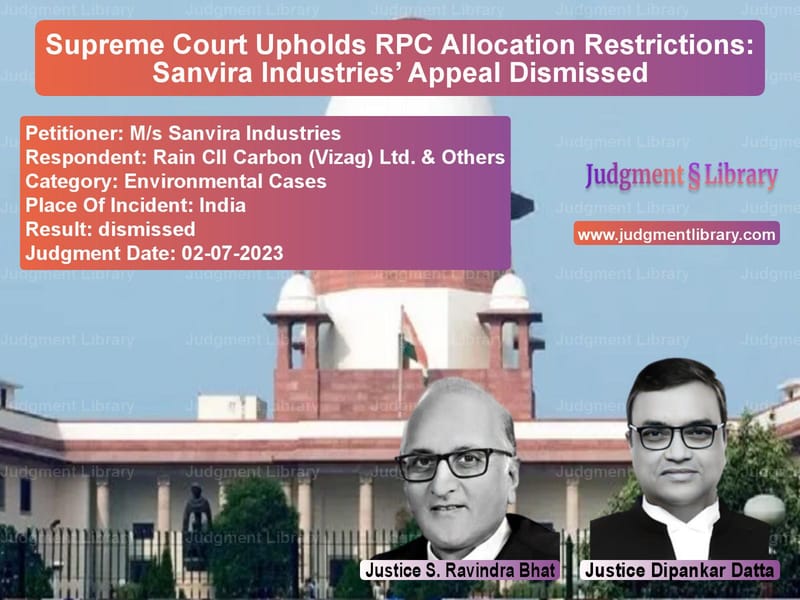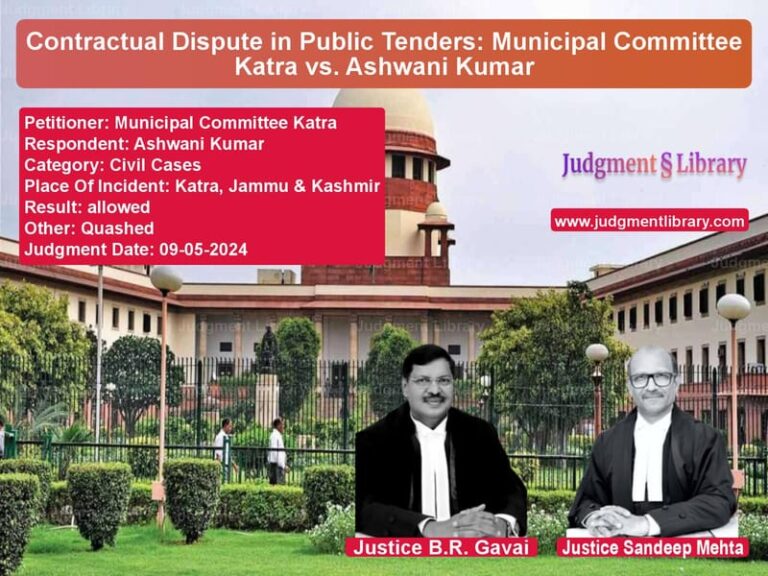Supreme Court Upholds RPC Allocation Restrictions: Sanvira Industries’ Appeal Dismissed
The case of M/s Sanvira Industries v. Rain CII Carbon (Vizag) Ltd. & Others revolves around the allocation of raw petroleum coke (RPC) for industrial use in India. The Supreme Court upheld the government’s restriction on increasing RPC allocation beyond the limits set in previous judgments, dismissing Sanvira Industries’ appeal for an increased allocation.
Background of the Case
RPC is a byproduct of petroleum refining and is used as a fuel in various industries, particularly in manufacturing calcined petroleum coke (CPC), a critical input for the aluminum industry. However, RPC has high sulfur content and emits harmful particulates, prompting environmental concerns.
The allocation of RPC became a contentious issue after the Ministry of Environment, Forest and Climate Change (MoEF) imposed restrictions in 2018, allowing import only for industries that use it as feedstock, not as fuel.
Key Developments Leading to the Dispute
- July 18, 2018: The MoEF decided that RPC imports should be restricted to industries that use it as a raw material, following a Supreme Court directive in the M.C. Mehta v. Union of India case.
- October 9, 2018: The Supreme Court capped annual RPC imports at 1.4 million metric tonnes (MMTPA) for calciner industries.
- April 2019: The Director General of Foreign Trade (DGFT) rejected Sanvira’s request for increased allocation, arguing that its increased production capacity was approved after the Supreme Court’s order.
- January 2020: The Ministry of Commerce also refused to increase Sanvira’s allocation, citing environmental concerns.
- July 3, 2023: The Supreme Court dismissed Sanvira’s appeal, confirming that the original 1.4 MMTPA cap must be maintained.
Arguments Presented Before the Supreme Court
Sanvira Industries’ Arguments
The appellant, Sanvira Industries, contended that:
- Its production capacity had increased from 200,000 MTPA to 330,000 MTPA before the Supreme Court’s October 9, 2018, ruling.
- The allocation process should consider its actual installed capacity rather than historical production figures.
- The Andhra Pradesh Pollution Control Board (APPCB) had certified its enhanced capacity on May 4, 2020, which should justify increased RPC allocation.
- The rejection of its allocation increase was arbitrary and violated principles of natural justice.
Arguments by Respondents (Rain CII Carbon and Others)
The respondents, including Rain CII Carbon (Vizag) Ltd. and the Government of India, opposed Sanvira’s plea, arguing that:
- The Supreme Court’s October 9, 2018, ruling had fixed the total RPC import cap at 1.4 MMTPA, which could not be changed.
- The claim of increased capacity was made after the Supreme Court’s ruling, making it ineligible for additional allocation.
- Allowing post-2018 capacity increases would lead to indiscriminate environmental harm and defeat the purpose of the restrictions.
- Sanvira’s earlier pleas for increased allocation had already been rejected multiple times by various government agencies and the courts.
Supreme Court’s Analysis and Judgment
A bench comprising Justices S. Ravindra Bhat and Dipankar Datta ruled against Sanvira Industries, emphasizing the importance of environmental regulations and the need for consistency in policy implementation.
Key Observations of the Court
1. The Supreme Court’s 2018 Order is Final and Binding
“The order passed by this Court is clear. This Court has set the outer limit for import of Raw Pet Coke [RPC] at 1.4 MMTPA per annum in total.”
The Court reaffirmed that the total import cap cannot be increased and that all industries must operate within this restriction.
2. No Special Consideration for Post-2018 Capacity Expansions
“Prayers made on the basis of expansion etc. are totally misconceived and cannot be entertained.”
The Court ruled that expansions approved after October 9, 2018, cannot justify a demand for additional RPC allocation.
3. Pollution Concerns Take Precedence Over Industrial Expansion
“Petroleum coke is a highly polluting fuel, and exemptions for industries should not negate efforts to control pollution.”
The Court emphasized that any policy change increasing RPC imports would undermine environmental protection measures.
4. Government’s Decision is Consistent and Fair
The Court noted that the Ministry of Commerce and the DGFT had been consistent in rejecting all requests for increased allocation, including those from other companies like Rain CII.
Final Ruling
The Supreme Court dismissed the appeals of Sanvira Industries, ruling that:
“The appeals fail and are, accordingly, dismissed, without order on costs.”
Impact of the Judgment
The ruling has significant implications for the industrial and environmental sectors:
- Prevents Unlimited Expansion: Industrial units cannot claim more RPC allocation based on post-2018 capacity increases.
- Reaffirms Environmental Protection: The decision upholds strict controls on high-polluting fuels to mitigate air pollution.
- Maintains Policy Stability: Businesses must adhere to government-imposed restrictions and cannot circumvent them through legal challenges.
- Ensures Fair Allocation: The ruling prevents a situation where a single industry disproportionately benefits at the expense of others.
Conclusion
The Supreme Court’s judgment in Sanvira Industries v. Rain CII Carbon upholds environmental restrictions on petroleum coke imports while reinforcing the binding nature of previous judicial rulings. By maintaining the 1.4 MMTPA import cap and rejecting post-2018 capacity expansions as a basis for increased allocation, the Court has ensured that industrial policies remain environmentally sustainable and legally consistent.
Petitioner Name: M/s Sanvira Industries.Respondent Name: Rain CII Carbon (Vizag) Ltd. & Others.Judgment By: Justice S. Ravindra Bhat, Justice Dipankar Datta.Place Of Incident: India.Judgment Date: 02-07-2023.
Don’t miss out on the full details! Download the complete judgment in PDF format below and gain valuable insights instantly!
Download Judgment: ms-sanvira-industri-vs-rain-cii-carbon-(viz-supreme-court-of-india-judgment-dated-02-07-2023.pdf
Directly Download Judgment: Directly download this Judgment
See all petitions in Environmental Cases
See all petitions in Legislative Powers
See all petitions in Public Interest Litigation
See all petitions in Judgment by S Ravindra Bhat
See all petitions in Judgment by Dipankar Datta
See all petitions in dismissed
See all petitions in supreme court of India judgments July 2023
See all petitions in 2023 judgments
See all posts in Environmental Cases Category
See all allowed petitions in Environmental Cases Category
See all Dismissed petitions in Environmental Cases Category
See all partially allowed petitions in Environmental Cases Category







